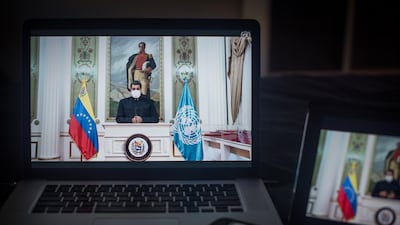The UN General Assembly is, in normal years, held amid tight security for fear of terrorist strikes.
This year, the biggest threat is a microscopic virus, which has upended New York’s annual diplomatic jamboree.
Gone is the parade of world leaders, their motorcades, vast entourages and checkpoints manned by police wearing body armour and toting assault rifles.
The din of chanting protesters does not drift between the skyscrapers of Midtown East.
Instead, the occasional cyclist pedals along a desolate First Avenue.
Inside the General Assembly hall, diplomats wearing face masks sit two metres apart, watching pre-recorded speeches from leaders on screens and clapping politely.
For UN veterans, the 2020 assembly is more manageable than in years past.
But the lack of face-to-face diplomacy may cost a world that is increasingly riven by feuding between the US, China and others.
Ian Williams, an author, journalist and former president of the UN Correspondents Association, said coronavirus had kept leaders in their capitals but they still suffered from "oratorical incompetence".
"For 30 years I ran the gauntlet of New York police, secret service and UN security to hear mostly boring speeches," Williams told The National.
“This year I can lie in bed and watch them from my laptop.”
The highlight of any UN assembly is the General Debate, when presidents, prime ministers and kings ascend the 193-nation assembly hall’s marble dais.
This year, US President Donald Trump criticised Beijing for the “China virus” and Venezuelan leader Nicolas Maduro said Washington threatened “peace in this world”.
But those speeches were recorded days ago. The UN’s technicians simply pressed the play button and emailed texts of the speeches to journalists.
For this reason, critics dubbed the virtual UN summit the “world’s worst Zoom meeting”.
While the broadcast was mostly seamless, the opening address by Brazilian President Jair Bolsonaro had to be restarted after an embarrassing glitch with the automatic translation for on-screen subtitles.
Speaking in Portuguese, Mr Bolsonaro railed against fake news of Amazon rainforest wildfires.
For those following the English text below, however, the populist was spouting gibberish about a “cocoa hidden danger”.
One upside, even just logistically for the UN staffers keeping the parade of important global figures on schedule, was that the recorded speeches meant leaders kept largely to their allotted time.
No one tried to challenge VK Krishna Menon's more than eight-hour address in 1957, nor did anyone come close to Fidel Castro’s 269-minute opus in 1960 or Muammar Qaddafi’s 96-minute haranguing in 2009.
The UN broadcast speeches on its YouTube channel, offering the viewing public an opportunity to add their thoughts in the comments stream – a bewildering array of emojis, slogans and slurs.
Some viewers issued political demands, such as “save the Amazon”; others conveyed yawning frustration with “Zzzzzzzzz”.
Amid the stream of leaders, one viewer even declared: "Wakanda forever", although the fictional African utopia from the 2018 Black Panther movie is not known to be seeking UN membership.
The online format did not kill all diplomatic theatre.
When Turkish President Recep Tayyip Erdogan took a swipe at Israel’s “dirty hand” on Tuesday, Israel’s ambassador Gilad Erdan walked out of the assembly hall, complaining of anti-Semitism.
Mr Erdan had more luck on Wednesday, when he sat down for the first time with UAE ambassador Lana Nusseibeh, cementing a normalisation accord signed between the two nations on the White House lawn this month.
That was one of this year’s few UN bilateral sit-downs, which are the lifeblood of UN diplomacy.
Usually, a floor of the headquarters building is filled with dozens of booths for diplomats to press the flesh and cut deals.
These are not just for bigwigs such as Mr Trump and Saudi King Salman. They are where a foreign minister from Palau can meet officials from faraway Barbados and share thoughts on rising tides and global warming.
For Volkan Bozkir, the Turkish diplomat who was recently appointed President of the General Assembly, this marked a big loss amid fighting in Libya, Yemen, Syria and Afghanistan, and cross-border tensions between India and China.
The “leaders of our nations are not personally present” when the “need for deliberation is higher than ever”, Mr Bozkir said on Tuesday.
“Rarely has the whole of humanity faced such an eminent and common threat."
The UN parley in normal years draws about 10,000 people from around the world.
But that was unthinkable at a time when countries imposed strict entrance requirements to halt the spread of Covid-19, which has claimed about 984,000 lives.
























